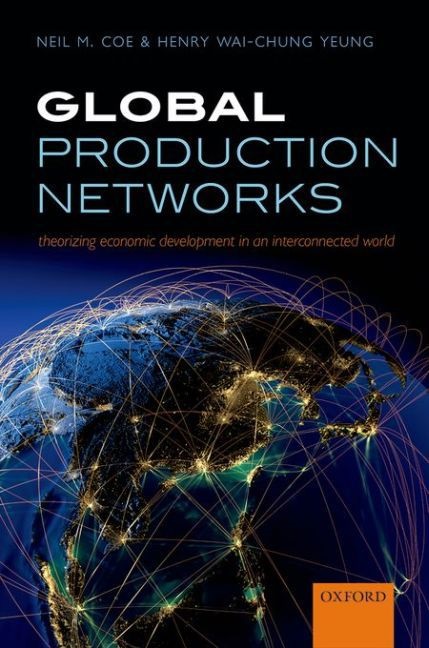Share
Fr. 57.90
Neil M. Coe, Neil M. Wai-Chung Yeung Coe, Neil M. Yeung Coe, Yeung Coe, Henry Wai-chung Yeung
Global Production Networks - Theorizing Economic Development in an Interconnected World
English · Paperback / Softback
Shipping usually within 2 to 3 weeks (title will be printed to order)
Description
Accelerating processes of economic globalization have fundamentally reshaped the organization of the global economy towards much greater integration and functional interdependence through cross-border economic activity. In this interconnected world system, a new form of economic organization has emerged: Global Production Networks (GPNs). This brings together a wide array of economic actors, most notably capitalist firms, state institutions, labour unions, consumers and non-government organizations, in the transnational production of economic value.
National and sub-national economic development in this highly interdependent global economy can no longer be conceived of, and understood within, the distinct territorial boundaries of individual countries and regions. Instead, global production networks are organizational platforms through which actors in these different national or regional economies compete and cooperate for a larger share of the creation, transformation, and capture of value through transnational economic activity. They are also vehicles for transferring the value captured between different places.
This book ultimately aims to develop a theory of global production networks that explains economic development in the interconnected global economy. While primarily theoretical in nature, it is well grounded in cutting-edge empirical work in the parallel and highly impactful strands of social science literature on the changing organization of the global economy relating to global commodity chains (GCC), global value chains (GVC), and global production networks (GPN).
List of contents
- 1: Global production networks 2.0
- 2: Organization
- 3: Dynamics
- 4: Strategies
- 5: Development
- 6: Praxis
About the author
Neil M. Coe is Professor of Economic Geography at the National University of Singapore. His research interests are in the areas of global production networks and local economic development; the geographies of local and transnational labour markets; the geographies of innovation; and institutional and network approaches to economic development. He has published over 75 articles and book chapters on these topics, and is a co-author of Spaces of Work: Global Capitalism and the Geographies of Labour (Sage, London, 2003) and Economic Geography: A Contemporary Introduction (Wiley, NJ, 2013, second edn.). He is an Editor of the Journal of Economic Geography and Director of the Singapore Journal of Tropical Geography.
Henry Wai-chung Yeung is Professor of Economic Geography and Co-Director of GPN@NUS Centre at the National University of Singapore. He was awarded the 2017 Murchison Award for his 'pioneering publications in the field of globalization'. The award is given by the Royal Geographical Society (with the Institute of British Geographers). His research interests cover global production networks, East Asian firms, and the political economy of development. He is the author of Transnational Corporations and Business Networks (Routledge, 1998), Entrepreneurship and the Internationalisation of Asian Firms (Edward Elgar, 2002), and Chinese Capitalism in a Global Era (Routledge, 2004). He has published 7 edited books, over 85 academic journal articles, and 40 book chapters. He is Editor of Environment and Planning A and Economic Geography, and serves on 20 other international journals.
Summary
Globalization and supply chains have re-shaped the organization of the global economy in to global production networks. The authors provide a clear framework for understanding these developments.
Additional text
Given the absence of a book-length treatment of GPN's by the extant literature, the value-add offered by Coe and Yeung in terms of delineating unified casual explainations for the rise and persistence of GPN's is timely and noteworthy. Across its six chapters, the book is cognizant of complementary aproaches, and seeks to inform subsequent empirical exploration by attempting conceptual development of the GPN framework. Coe and Young proceed to profile the actors involved in GPN's as well as the characteristics of these networks in Chapter 2. This is a key strength of the book, where the role of actors ex-firms such as the state, international organisations, and intermediaries are acknowledged and scrutinised for their impact on overall firm activity. Coe and Yeung have done an excellent job in illuminating a fundamental puzzle involving the evolution of production in the world economy, even as they develop a coherent theory of GPN's.
Report
Coe and Yeungs Global Production Networks is a significant addition to the diverse and rapidly growing literature on international economic development . . . The book contains numerous insights and hypotheses that can guide future empirical research, and it is likely to both sharpen theoretical debates and offer grounds for constructive dialogue among the many scholars who look at economic development through the lens of inter-firm production networks. Gary Gereffi, Professor of Sociology and Director of the Center on Globalization, Governance & Competitiveness, Duke University
Product details
| Authors | Neil M. Coe, Neil M. Wai-Chung Yeung Coe, Neil M. Yeung Coe, Yeung Coe, Henry Wai-chung Yeung |
| Publisher | Oxford University Press |
| Languages | English |
| Product format | Paperback / Softback |
| Released | 02.07.2015 |
| EAN | 9780198703914 |
| ISBN | 978-0-19-870391-4 |
| No. of pages | 288 |
| Subjects |
Education and learning
> Vocational and technical college books
Social sciences, law, business > Business > Economics |
Customer reviews
No reviews have been written for this item yet. Write the first review and be helpful to other users when they decide on a purchase.
Write a review
Thumbs up or thumbs down? Write your own review.

